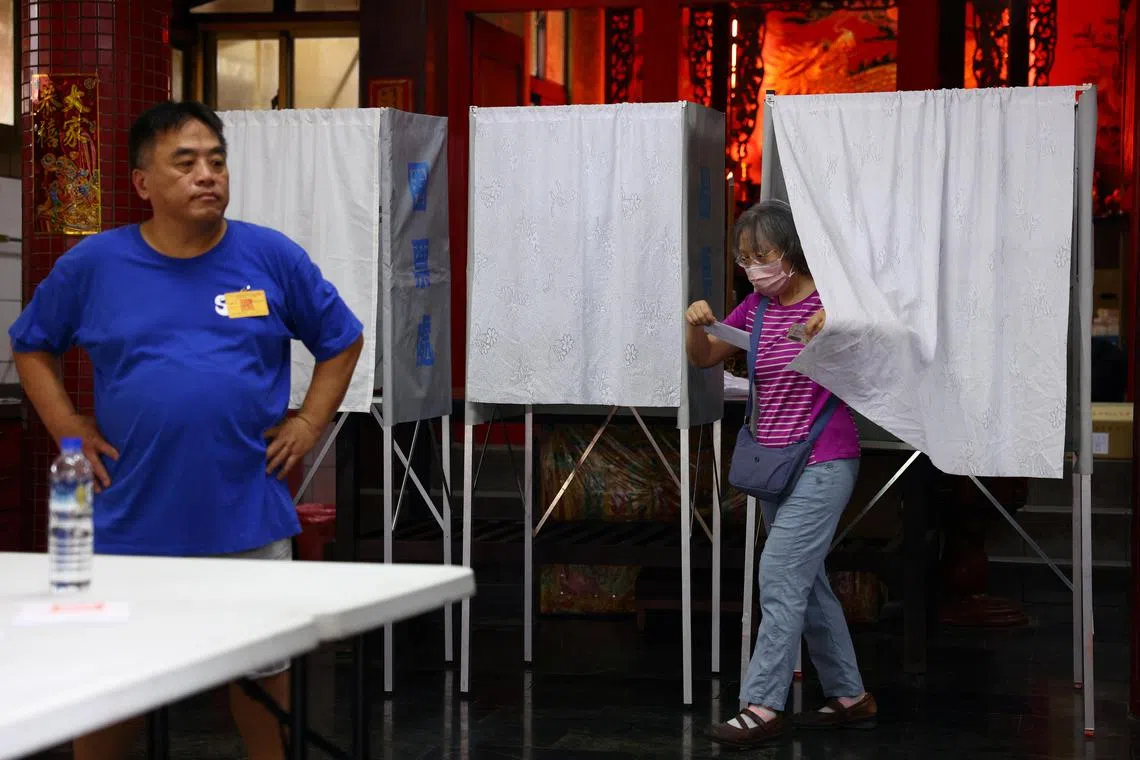News analysis
Political compromise in Taiwan needed after recall vote deals major blow to President Lai
Sign up now: Get insights on Asia's fast-moving developments

A voter leaving a booth during a recall election, at a polling station in Taipei on July 26.
PHOTO: REUTERS
Follow topic:
TAIPEI – Taiwan President Lai Ching-te and his ruling Democratic Progressive Party (DPP) must find a way of reaching out to what will likely be an emboldened opposition-controlled legislature if there is any hope of breaking the island’s political gridlock, analysts said.
This comes after voters in Taiwan overwhelmingly rejected an attempt
“The results of the recall vote showed that the public are in favour of maintaining the current balance of power in politics,” said Professor Liu Jia-wei from National Taipei University’s public administration and policy department.
“The DPP must now respect public opinion and make some compromises with the opposition on some things to avoid further political polarisation,” she added.
For a start, Mr Lai could show some goodwill by consulting the opposition before selecting his justice nominees for Taiwan’s top court, said Prof Liu.
Taiwan has been paralysed by legislative gridlock for the past 1½ years, with its various parties unable to come to a consensus on most issues. On more than one occasion, lawmakers have engaged in verbal attacks and physical scuffles in the Legislative Yuan.
On July 26, voters in every targeted constituency rejected the recall effort, dashing the DPP’s hopes of regaining control of the legislature, where it has been unable to pass laws since a January 2024 election as it does not have a majority.
In the 113-seat Chamber, the opposition alliance commands a majority, with the KMT occupying 52 seats and the smaller Taiwan People’s Party eight. Two more seats belong to independents who are ideologically aligned with the KMT.
The DPP has 51 seats.
Moreover, analysts said the recall results demonstrated how the DPP’s “resist China, protect Taiwan” messaging
While the recall petitions were initiated by civic groups, the ruling party had backed the activist movement, accusing the KMT of blocking key legislation in favour of Beijing. Campaigners argued that such actions, such as cuts to defence programmes, jeopardised Taiwan’s security in the face of heightened military threats from China.
But Professor Su Tzu-chiao, a political science expert at Taipei’s Soochow University, said such discourse was ineffective for a legislative election.
“That kind of messaging might work for a presidential election, but voters expect legislators to mostly deal with lower-level domestic issues. It’s difficult for voters to buy the argument that all pan-blue legislators are Chinese Communist Party agents,” he said, referring to the KMT’s party colour.
For its part, the KMT has always denied it is pro-Beijing, saying instead that its frequent visits to China are part of a necessity to keep cross-strait communication lines open.
In the weeks leading up to the election, some of Mr Lai’s harsh rhetoric turned off moderate voters wary of Taiwan’s deepening political divide, experts added.
In a controversial speech in June, he sparked a fierce backlash when he made comments about “removing impurities” through democratic processes such as elections and recall movements.
“Just like striking iron or forging a sword – you must keep hammering to drive out all the impurities until all that’s left is an iron will to defend our sovereignty and safeguard our democracy,” he said.
The remarks were widely interpreted to mean that Taiwan had no room for dissenting voices and that the elected opposition should be purged from society.
Assistant Professor James Yifan Chen, a political science analyst at Taiwan’s Tamkang University, said: “Lai and the DPP should develop better approaches to unify Taiwan.”
“Labelling the opposition as disloyal and fabricating imaginary enemies within Taiwan were not well received by voters,” he told The Straits Times.
Going forward, the DPP should also focus on more pressing domestic issues such as the public’s anxiety over US trade tariffs on Taiwan – or risk further losses in the 2026 local elections, he added.
Taipei is scrambling to negotiate a deal with Washington to lower a proposed tariff of 32 per cent on the island ahead of a fast-approaching Aug 1 deadline, when such levies may otherwise go into effect.
Following the recall vote, the DPP said it humbly accepted the outcome and would adjust its approach to better meet people’s expectations. But the party also repeated claims that China has been interfering in Taiwan’s affairs.
DPP secretary-general Lin Yu-chang said at a media briefing: “This unprecedented civic movement was driven by love for the country, love for Taiwan, and to protect Taiwan against the Chinese Communist Party of China.”
But while the outcome of the recall vote has delivered a major setback for the ruling party, it is by no means time for the KMT to sit back.
A look at voter numbers indicates that public support for the recall movement remained strong. For instance, those who voted for the removal of New Taipei legislator Yeh Yuan-chih were only 3,560 votes short of those who voted to keep him in office.
Prof Chen said: “The recall outcome is not necessarily a victory for the KMT but rather a sign that Taiwanese voters don’t want their democratic institutions to be abused by the DPP.”
He added: “The KMT should reflect on its own agenda-setting to seize the momentum for next year’s local elections. A change in the KMT’s chairperson and leadership could signal the party’s determination to present a fresh image to voters.”
Another seven KMT lawmakers are facing a similar recall vote on Aug 23.


